A few weeks ago, friend and colleague, Erik Stewart posted on Facebook, some very thoughtful feedback about a large project I’m currently tackling; writing a book. Yes, an entire book that has occupied much of my time for the past three years, with this past year being the most demanding.
I’ll be honest; I never thought I had it in me to compose anything more than a weekly blog. But with encouragement from so many like Erik, who are willing to devote time to scrutinizing my transcript as well as lend advice and provide me with helpful feedback, I’ve been able to fill empty pages with words that are evolving into a solid and compelling story. I’m excited that the telling of this fantastic journey of the past seven years to aid in the release of five (originally six) men wrongfully convicted of murder in 1992 is coming to fruition.

T-shirt logo for six innocent men
My reasons for writing this book are critical at a time of extreme and unfair biases and blatant cruelty toward others no matter where we look. I believe it is imperative that we, as a society, be cognizant of the injustices that inundate the lives of those around us and realize the necessity to help correct them. If all of us experienced the depth of emotional healing and gratification that accompany selfless actions, I believe we all would become better people.
Proof of action must accompany words of wisdom which is the embodiment of this literature. Being an example and inspiring those who read it to focus more on working through problems with patience and kindness rather than misguided judgement or criticism is the underlying message. As I work through a lengthy process of creating what I call someone else’s story through my eyes, the ultimate goal is to produce an honest book that is equally informative and accurate that will spur discussion about wrongful convictions and about our flawed judicial system.
As depressing as the book’s subject matter is, the story will end on a positive note even though the overall journey remains unresolved. It depicts a moment in time that catapulted a situation from devastating to one of hope and distinct possibilities, with an appreciation that the actions of complete strangers have brought forth comfort and peace of mind to its victims for the first time in years. I’ve been told the story I’ve composed is a seamless extension of the book that compelled me to get involved, The Monfils Conspiracy; The Conviction of Six Innocent Men.
Today I’m unveiling an excerpt that sets the tone for my entire book. It is the testimonial of an individual that I deeply respect and who has maintained the highest form of integrity despite immeasurable pain and suffering for two decades. I am pleased that Keith Kutska, the main suspect in this wrongful conviction case, has agreed to compose a Foreword for my book. I am honored to share it with you now. I read it to an intimate crowd of family and close friends of the men in prison at our seventh annual Walk for Truth and Justice in Green Bay, Wisconsin on October 28, 2016.

Joan Treppa speaking at seventh annual ‘Walk for Truth and Justice’
Please consider these thoughtful words from an innocent man:
Foreword by Keith Kutska:
While at the James River Paper Mill on the morning of November 21, 1992, Tom Monfils disappeared from his work area and was later found dead at another location in the mill. Despite the evidence pointing to suicide, the police assumed that an “angry mob” of his co-workers had murdered him. The investigation soon centered on six men who had been working at the mill that day. I know this because I am one of those six.
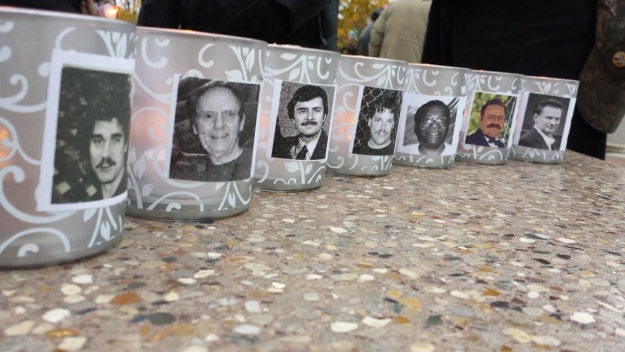
(L to R) Decedent, Tom Monfils, Convicted men; Dale Basten, Mike Johnson, Mike Hirn, Rey Moore, Keith Kutska and exoneree Mike Piaskowski
Few people, unless they or someone close to them has experienced what the “Monfils six” and their families have endured, are likely to understand the anxiety and sense of helplessness that overtakes an innocent person while he cooperates with law enforcement, only to have it call him a liar, a thug, and a murderer. Few can know what an innocent person suffers as he loses his job and becomes the subject of media stories and public contempt for a crime he did not commit. They will not experience or know the frustration that an innocent person experiences watching his family suffer as the investigation and trial continue.

Garrett waiting for his Great Grandad, Mike Johnson, to be released from prison
Most people assume, as I once did, that even if the police and prosecutors do not know or admit the truth, the jury will surely find it in the end. In the “Monfils six” case, like in other wrongful conviction cases, this did not happen. All six of us were convicted of first-degree intentional homicide, sentenced to life in prison, and separated from our families and everything else that made our lives worthwhile. From then on, we could only hope that someday the truth would become clear and the injustice corrected. Our days would be filled with the depression, despair, and disappointment that an innocent man endures as his appeals and other legal efforts fail, and he fears that he will never regain his freedom and life.
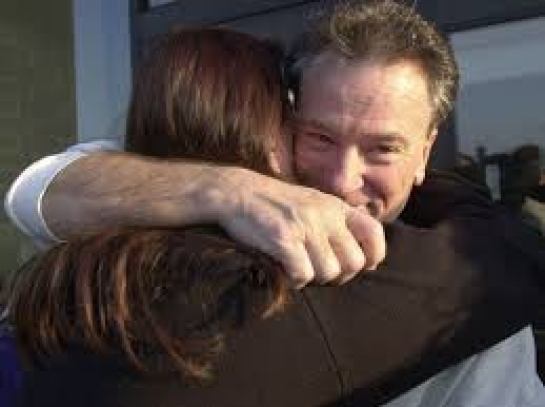
Exoneree Michael Piaskowski hugging his daughter, Jenny, upon release in 2001
Staying hopeful is difficult. Because I have been convicted, the struggle is uphill. That is something that every wrongfully convicted person soon learns. What I have also learned is that an innocent person can choose to maintain his own integrity. That is one thing that the system cannot take. I will continue to speak the truth and declare my innocence, just as the other members of the “Monfils six” have.
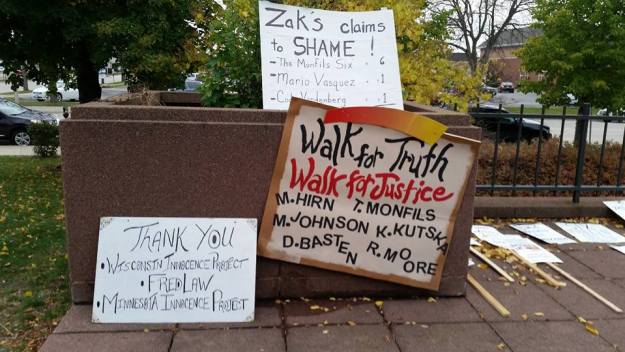
Signs carried by supporters in 2016 Walk for Truth and Justice
After I had been in prison for more than fifteen years, I received a letter from Joan Treppa, a woman I had never met, but whose life was also changed by this case. She became a champion for all of us and for all wrongfully convicted people. If we regain our freedom, it will be because Joan cared and acted when she saw an injustice. I hope that this book inspires others to follow her path and become advocates for the wrongfully convicted. –Keith M. Kutska
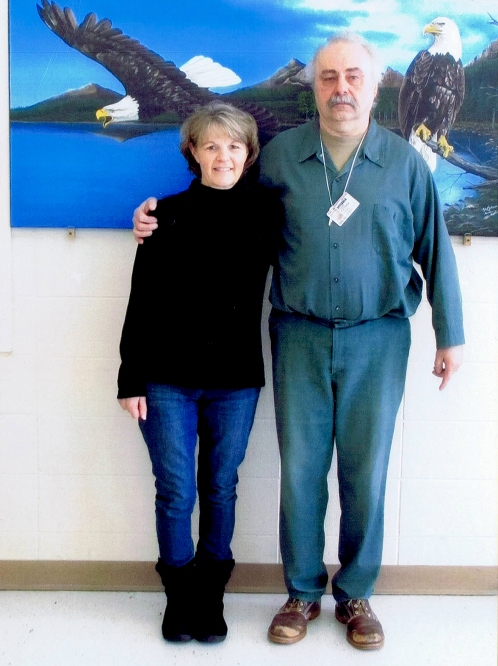
Meeting Keith Kutska for the first time in 2015
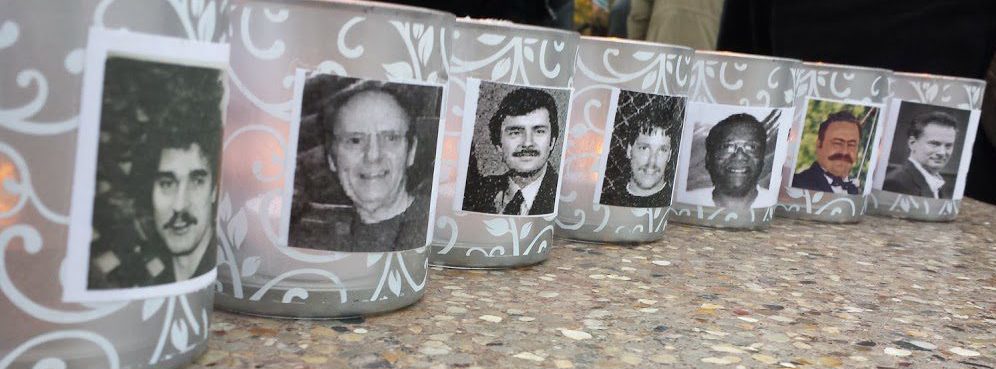
Go, Joan.
Thank you Sue. Peace, my friend.
Exciting news, Joan. Keep writing and best wishes with this most important calling. <3
Thank you so much Carol. Sorry I have not kept up with your writing lately.
It’s good to hear from you, Joan, and I understand all too well how much time and focus it takes to work on a book manuscript. I was so excited to hear that you have been working on one! I wish you the best with your important work and look forward to reading it when you’re done. Be well, dear friend. <3
You as well. And best wishes for all that you do, my friend.
I love the foreword. It’s very well written. Justice will prevail no matter what. Bless your golden heart, Joan, for the great initiative. Go Joan Go!
Thank you for your kind and thoughtful words of encouragement Lucy. Bless you.